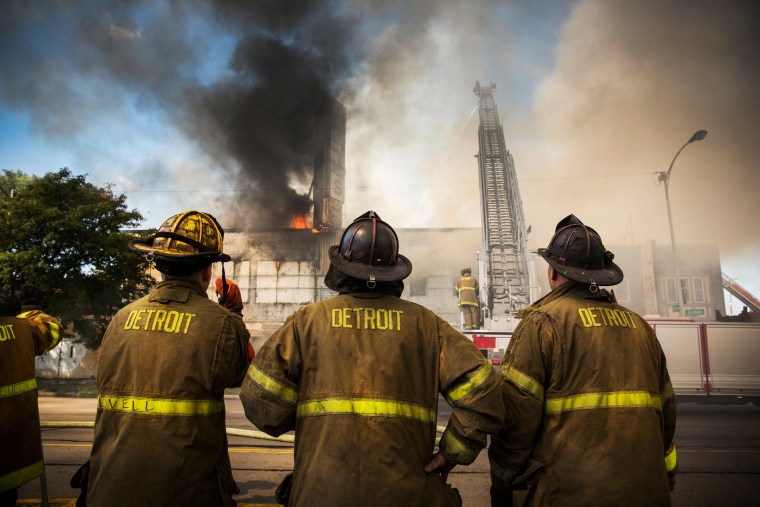Protesters swarmed outside the Detroit courthouse where the federal trial to determine whether or not the city is eligible to file for the country’s largest municipal bankruptcy got underway Wednesday.
The city’s state-appointed emergency manager Kevyn Orr filed for bankruptcy in July, saying it was impossible for the city to pay its debts of more than $18 billion, and the city’s debtors, including retired city employees, are now fighting to ensure their promised pay isn’t cut off.
For former city employee Donald Smith, 68, who survives on an $800 monthly pension, plus a few hundred more from Social Security benefits, the trial could have very real consequences.
“Basically, now I’m struggling to make ends meet,” Smith, who spent 29 years working for the city in various capacities, told MSNBC.com. “They cut my pension and health benefits, they might as well just throw me out in front of a truck and kill me.”
Orr’s office estimates that Detroit has an unfunded pension liability of $3.5 billion, a significant chunk of the city’s $18 billion in overall debt. He has repeatedly signaled any bankruptcy deal would have to result in a “haircut” for those pensions—something which the city’s public employee unions and retirement systems argue would violate the Michigan state constitution. Federal bankruptcy judge Steven Rhodes will determine whether the retirement benefits can be cut through bankruptcy despite the state constitution’s description of pensions as “a contractual obligation … which shall not be diminished or impaired.”
“I might have $1,400 or $1,500 and then you have to pay rent, lights, you have to pay the telephone bill, all those other things,” Smith said. “I might be living off of $200 a month by the time all of those deductions are out. Can you live off of $200 a month?”
"It might come to a point where it’s either college [for my kids] or health care."'
Already, Smith’s health benefits have received a drastic cut from Detroit’s emergency manager. Earlier this month, the city government sent word that it would be replacing its current health care system for retirees with a monthly stipend of $200 or less. Retired firefighter David Allen told msnbc that cut, combined with lower pension benefits, could be “catastrophic” for his family.
“I’m definitely going to have to cover my own health care, and that’s definitely going to cut into my kids’ college fund. So it might come to a point where it’s either college or health care,” he said. Allen, the father of a teenage son and daughter, retired early after sustaining a debilitating spinal injury in the line of duty.
“I go to work every day, I do my job. I do my job to the best of my ability, and I get hurt through no fault of my own,” he said. “And, because I got hurt, I got retired. You want to take food out of my mouth and my kids’ mouth.”
Firefighter Brendan Milewski, 34, was also sent into early retirement after a work-related injury cost him the use of his legs. Now he lives off his pension benefits and the modest income of his wife, a self-employed hairdresser. He said that he and his wife operate on a slim margin, but that pension cuts would be even more “disastrous” for those who are too old to start over.
“There are things you accept when you take on a career in public safety,” he said. “You understand there’s an inherent danger in the job, you understand you’re going to spend time away from your family, you understand that you’re going to compromise your health due to the nature of the [job]. But you also accept the fact that when you sign up, there’s a light at the end of the tunnel, the pension plan.”
Said Milewski, “If you start chipping into one thing that was promised to us at the end, you have nothing left.”
